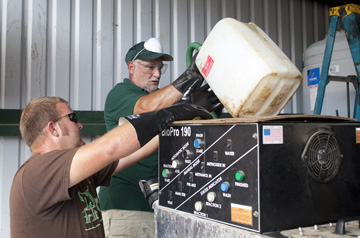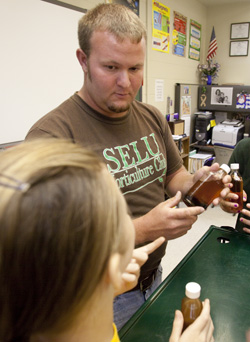Student learns first hand about alternative energy
On the home page:
Click on the thumbnail for a larger image.
Senior Clint Rushing explains the process of producing biodiesel from used cooking oil to sixth graders at the Southeastern Laboratory School
Clint Rushing, senior, general studies (horticulture concentration)
Martin “Chip” Perilloux, Southeastern Physical Plant
 |
|
Clint Rushing, left, and Martin "Chip" Perilloux |
When Southeastern student Clint Rushing first heard the university’s Physical Plant
was planning on generating its own biodiesel fuel, he admits he was skeptical. To
him, it was one of those ideas that sounded good, but probably wasn’t that practical.
His mind changed when he saw a small shed being constructed, and the actual equipment
to produce the biodiesel began to arrive.
“One thing led to another, and before I knew it the biodiesel plant was in operation,”
said Rushing, a senior from the town of Livingston.
A general studies major with a concentration in horticulture, he has worked with the
university’s grounds crew for more than three years.
The biodiesel manufacturing started out as somewhat messy process and as Clint says,
“definitely not my favorite job.” In a short time, however, it has turned into a smooth
operation that’s yielding a recycled fuel to power the university’s tractors, lawn
mowers, and other diesel-powered equipment.
 |
| Rushing shows a Southeastern Laboratory School sixth grader a sample collected during the biodiesel conversion process. |
Southeastern’s foray into biodiesel generation that recycles spent cooking oil and grease from the university’s cafeteria and other food operations began when Chief Information Officer Mike Asoodeh obtained a grant from the Student Technology Committee to purchase biodiesel manufacturing equipment.
After supervising a graduate student studying alternative energy sources, Asoodeh concluded a recycling plant like this would be a real-world learning opportunity for undergraduate and graduate students in a variety of technical or scientific fields, while also providing the university with savings on fuel costs.
Martin “Chip” Perilloux, who has worked with Southeastern’s landscaping and grounds group for 27 years, was charged with setting up the operation. After reading everything he could find on the process and talking with personnel at other institutions that have a similar system, he and Clint developed ways of making the job easier.
“Clint has been involved in this since the beginning,” said Perilloux. “He knows the process inside and out. He has been a valuable assistant in getting this operation under way.”
Using spare parts collected around the plant, the two with the aid of plumbers built a “super sucker” vacuum machine that makes collecting the grease from the university’s kitchens a lot easier and less unpleasant. After collecting the used oil and grease, the waste material is placed into a large drum where food particles and water are separated. The clean oil is then pumped into a processor where chemicals are added to get the required reactions. Within four days, a new batch of biodiesel fuel is produced and ready to be used in the university’s equipment. After including the costs of chemicals, Southeastern is producing the fuel for $ .64 per gallon, compared to the $2.80 or so per gallon cost when purchased commercially.
Nothing is wasted, according to Perilloux. The process produces several gallons of methanol, which is in turn used to produce the next batch of biodiesel. The waste product of the process is glycerin, the basic ingredient of soap.
Perilloux and Rushing gave the sixth grade science class at Southeastern Lab School an introduction into the generation of biodiesel, using the opportunity to discuss the topics of resource conservation, recycling and environmentalism. After a classroom lecture and answering dozens of questions from the ever-inquisitive students, they took the group to the plant itself where they participated in and observed the process of producing biodiesel.
“Chip’s dedication to making diesel got me really interested in the process,” said Clint, who plans to graduate in December. “When I first started with this, I never really considered it for a career, but after working with it, and long hours of experimenting and thinking about it, I could certainly see this as something in my future. It’s a growing industry and a fascinating process while helping to preserve our environment.”
More Homepage Stories...

